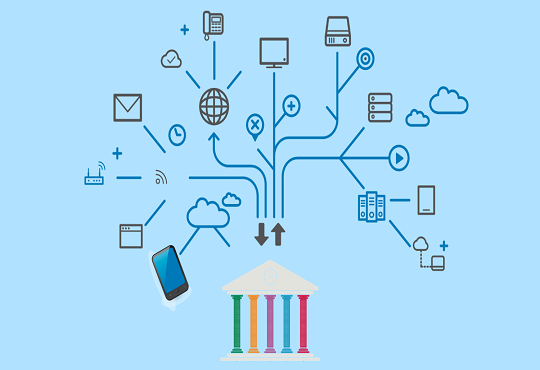How Blockchain Technology Can Improve Government Services
Janifha Evangeline | Thursday, 29 June 2023, 13:49 IST

Blockchain as one of the cutting-edge technologies is now being implemented by several governments across the globe. Additionally, there are potential for employing blockchain in the public sector and for government services in the background, where it works to improve the effectiveness, security, speed, and reliability of governmental institutions. But the public may see the blockchain-based digital government in every interaction they have with the decentralized system.
According to a survey, the government sector's blockchain market was estimated to be worth USD 153.9 million in 2021, but it is predicted to grow to USD 18.15 billion by 2030. This demonstrates unequivocally that governments are quite interested in this technology. In addition to producing more data, the hyper-connectivity that is now pervasive in our environment has also significantly changed how the economy functions and interacts.
The government must transform into one that is truly centered on its citizens by becoming more open, effective, cost-conscious, and real-time in this period of rapid change and economic transformation. And in order to address this newly discovered demand, a change that would rock a bureaucratic government agency is required. The introduction of a secure block chain architecture and other aspects of this technology must be encouraged for this transformation to occur.
The many advantages of a decentralized government centre on making government entities more effective, both in terms of how they operate and in terms of how well-liked they are by the general population. Three of the technology's key applications are at the centre of the majority of block chain use cases in government and the public sector:
When these basic areas are used either separately or in combination, the role of blockchain in government services has a wide range of effects, with three of them having the most national impact.
Building trust with its citizens
The tendency of ongoing mistrust must be reversed when people don't trust their government. And blockchain offers a solution to this issue with all of its unique qualities.
By enabling users to access and validate data, transparency, the key component of blockchain applications, alters attitudes in half. Blockchain technologies speed up the entire problem-solving process by enabling citizens to do their own independent verification of the claims made by the government.
GovCoin and the UK collaborated to create a blockchain for welfare payments. The app is a digital version of a "jam-jar" and this is used for paying for expenses such as rent, groceries, & utilities, and cryptocurrency is separated into several accounts, or "jars." In addition to the effectiveness of automatic payments, GovCoin avoids banks, which may keep desperately needed welfare funds for an extended period of time.
Protection of Sensitive data
Identity theft and data breaches have sadly become commonplace in today's world. Additionally, governments have emerged as the primary target of hackers worldwide as the default record manager of society.
Issues like the 2017 Equifax data breach, which exposed the personal information, including the social security number, of millions of Americans, and the 2015 Office of Personnel Management data loss incident, which resulted in the compromise of millions of government employees' data, are repeatedly blamed for undermining public confidence.
The good news is that these issues can be solved by developing blockchain applications. We can develop a safe, practical, and unchangeable system by leveraging blockchain to store and manage digital IDs.
By reducing the risk of single point of failure mistakes, the blockchain data format enhances network security and, in turn, renders a system impenetrable.
Improvement in efficiency and reduction of costs
Cost savings come in third on our list of the top advantages of blockchain for government services. Blockchain can be a lifesaver for the rulers of countries that have a budget of X dollars and must meet a requirement that costs X+1.
When used properly, blockchain technology can reduce costs while also preventing duplication of effort, streamlining workflows, boosting security, lessening the load of audits, and even ensuring that data integrity is preserved.
Let's look at the roughly $1 trillion in unreconciled funds that are present in the federal budget to further clarify this. Currently, reconciling these funds is a time- and money-consuming operation. However, when you look at instances of blockchain applications in the public sector's accounting and payment system, you get a permanent audit trail and a significantly sped-up reconciliation.
In order to employ blockchain in the distribution of international aid, the Denmark's Ministry of foreign Affairs teamed up with the virtual currency exchange Coinify. The time and money saved by avoiding the involvement of a third-party financial institution are the main advantages of blockchain for Denmark. Donors and Denmark's foreign aid fund can use cryptocurrencies to transmit funds directly to organisations collecting aid rather than going through banks.
Governments all over the world have taken notice of these benefits of blockchain technology and the plethora of other benefits that go along with it. Numerous governmental organizations have either begun to plan for or have already implemented the usage of blockchain data structures and its numerous use cases in their operations.
Governments and their judicial branches are the main repository for information on everything from land titles to business registration, marriage and divorce records, and criminal histories. Managing these registers is a difficult task that leads to corruption, fraud, high prices, and sluggish processing when done using outdated systems.




